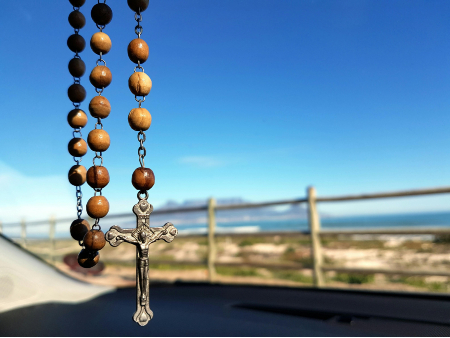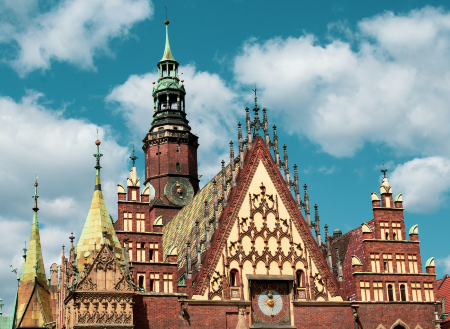We ask you, humbly: don't scroll away.
Hi readers, it seems you use Catholic Online a lot; that's great! It's a little awkward to ask, but we need your help. If you have already donated, we sincerely thank you. We're not salespeople, but we depend on donations averaging $14.76 and fewer than 1% of readers give. If you donate just $5.00, the price of your coffee, Catholic Online School could keep thriving. Thank you.Help Now >
Pope's Q&A With Young People (Part 1 of 2)
FREE Catholic Classes
"We Must Make God Present Again in Our Society"
VATICAN CITY, APRIL 24, 2006 (Zenit) - Here is Part 1 of the translation of the question-and-answer session Benedict XVI had with young people of the Latium region April 6 in St. Peter's Square, in preparation for the diocesan-level World Youth Day.
Part 2 will appear Tuesday.
* * *
1. Your Holiness, my name is Simone and I am from St. Bartholomew's Parish. I am 21 years old and am studying chemical engineering at La Sapienza University of Rome.
First of all, thank you for addressing to us the message for the 21st World Youth Day on the topic of the word of God that illuminates the human being's steps through life.
In the face of anxieties and uncertainties about the future, and even simply when I find myself grappling with the daily routine, I also feel the need to be nourished by God's word and to know Christ better in order to find answers to my questions.
I often wonder what Jesus would have done in my place in a specific situation, but I don't always manage to understand what the Bible tells me. Moreover, I know that the books of the Bible were written by different people in different ages, in any case, very distant from me. How can I understand that what I read is nevertheless the word of God which calls my life into question? Thank you.
 Hi readers, it seems you use Catholic Online a lot; that's great! It's a little awkward to ask, but we need your help. If you have already donated, we sincerely thank you. We're not salespeople, but we depend on donations averaging $14.76 and fewer than 1% of readers give. If you donate just $5.00, the price of your coffee, Catholic Online School could keep thriving. Thank you. Help Now >
Hi readers, it seems you use Catholic Online a lot; that's great! It's a little awkward to ask, but we need your help. If you have already donated, we sincerely thank you. We're not salespeople, but we depend on donations averaging $14.76 and fewer than 1% of readers give. If you donate just $5.00, the price of your coffee, Catholic Online School could keep thriving. Thank you. Help Now >
Benedict XVI: To begin, I shall answer by stressing a first point: It must first of all be said that one must not read sacred Scripture as one reads any kind of historical book, such as, for example, Homer, Ovid or Horace; it is necessary truly to read it as the word of God, that is, entering into a conversation with God.
One must start by praying and talking to the Lord: "Open the door to me." And what St. Augustine often says in his homilies: "I knocked at the door of the word to find out at last what the Lord wants to say to me," seems to me to be a very important point. One should not read Scripture in an academic way, but with prayer, saying to the Lord: "Help me to understand your word, what it is that you want to tell me in this passage."
A second point is: Sacred Scripture introduces one into communion with the family of God. Thus, one should not read sacred Scripture on one's own. Of course, it is always important to read the Bible in a very personal way, in a personal conversation with God; but at the same time, it is important to read it in the company of people with whom one can advance, letting oneself be helped by the great masters of "lectio divina."
For example, we have many beautiful books by Cardinal Martini, a true master of "lectio divina," who helps us to enter into the life of sacred Scripture. Nevertheless, one who is thoroughly familiar with all the historical circumstances, all the characteristic elements of the past, always seeks to open the door to show that the words which appear to belong to the past are also words of the present.
These teachers help us to understand better and also to learn how to interpret sacred Scripture properly. Moreover, it is also appropriate in general to read it in the company of friends who are journeying with me, who are seeking, together with me, how to live with Christ, to find what life the word of God brings us.
A third point: If it is important to read sacred Scripture with the help of teachers and in the company of friends, traveling companions, it is particularly important to read it in the great company of the pilgrim people of God, that is, in the Church.
Sacred Scripture has two subjects. First and foremost, the divine subject: It is God who is speaking. However, God wanted to involve man in his word. Whereas Muslims are convinced that the Koran was verbally inspired by God, we believe that for sacred Scripture it is "synergy" -- as the theologians say -- that is characteristic, the collaboration of God with man.
God involves his people with his word, hence, the second subject -- the first subject, as I said, is God -- is human. There are individual writers, but there is the continuity of a permanent subject -- the people of God that journeys on with the word of God and is in conversation with God. By listening to God, one learns to listen to the word of God and then also to interpret it.
Thus, the word of God becomes present, because individual persons die but the vital subject, the people of God, is always alive and is identical in the course of the millenniums: It is always the same living subject in which the word lives.
This also explains many structures of sacred Scripture, especially the so-called rereading. An ancient text is reread in another book, let us say 100 years later, and what had been impossible to perceive in that earlier moment, although it was already contained in the previous text, is understood in-depth.
And it is read again, ages later, and once again other aspects, other dimensions of the word are grasped. So it was that sacred Scripture developed, in this permanent rereading and rewriting in the context of profound continuity, in a continuous succession of the times of waiting.
At last, with the coming of Christ and the experience of the apostles, the word became definitive. Thus, there can be no further rewriting, but a further deepening of our understanding continues to be necessary. The Lord said: "The Holy Spirit will guide you into depths that you cannot fathom now."
Consequently, the communion of the Church is the living subject of Scripture. However, here too the principal subject is the Lord himself, who continues to speak through the Scriptures that we have in our hands.
I think that we should learn to do three things: To read it in a personal colloquium with the Lord; to read it with the guidance of teachers who have the experience of faith, who have penetrated sacred Scripture, and to read it in the great company of the Church, in whose liturgy these events never cease to become present anew and in which the Lord speaks with us today.
Thus, we may gradually penetrate ever more deeply into sacred Scripture, in which God truly speaks to us today.
--- --- ---
2. Holy Father, my name is Anna. I am 19 years old, I am studying literature, and I belong to the Parish of St. Mary of Carmel.
One of the problems we are constantly facing is how to approach emotional issues. We frequently find it difficult to love. Yes, difficult: Because it is easy to confuse love with selfishness, especially today when most of the media almost imposes on us an individualistic, secularized vision of sexuality in which everything seems licit and everything is permitted in the name of freedom and individual conscience.
The family based on marriage now seems little more than a Church invention, not to speak of premarital relations, whose prohibition appears, even to many of us believers, difficult to understand or anachronistic.
Knowing well that so many of us are striving to live our emotional life responsibly, could you explain to us what the Word of God has to tell us about this? Thank you.
Benedict XVI: This is a vast question and it would certainly be impossible to answer it in a few minutes, but I will try to say something.
Anna herself has already given us some of the answers. She said that today love is often wrongly interpreted because it is presented as a selfish experience, whereas it is actually an abandonment of self, and thus becomes a self-discovery.
She also said that a consumer culture falsifies our life with a relativism that seems to grant us everything, but in fact completely drains us.
So let us listen to the word of God in this regard. Anna rightly wanted to know what the word of God says. For me it is a beautiful thing to observe that already in the first pages of sacred Scripture, subsequent to the story of man's creation, we immediately find the definition of love and marriage.
The sacred author tells us: "A man will leave his father and mother and will cleave to his wife, and they will become one flesh," one life (cf. Genesis 2:24-25). We are at the beginning and we are already given a prophecy of what marriage is; and this definition also remains identical in the New Testament.
Marriage is this following of the other in love, thus becoming one existence, one flesh, therefore inseparable; a new life that is born from this communion of love that unites and thus also creates the future.
Medieval theologians, interpreting this affirmation which is found at the beginning of sacred Scripture, said that marriage is the first of the seven sacraments to have been instituted by God already at the moment of creation, in paradise, at the beginning of history and before any human history.
It is a sacrament of the Creator of the universe; hence, it is engraved in the human being himself, who is oriented to this journey on which man leaves his parents and is united to a woman in order to form only one flesh, so that the two may be a single existence.
Thus, the sacrament of marriage is not an invention of the Church; it is really "con-created" with man as such, as a fruit of the dynamism of love in which the man and the woman find themselves and thus also find the Creator who called them to love.
It is true that man fell and was expelled from paradise, or, in other words, more modern words, it is true that all cultures are polluted by the sin, the errors of human beings in their history, and that the initial plan engraved in our nature is thereby clouded. Indeed, in human cultures we find this clouding of God's original plan.
At the same time, however, if we look at cultures, the whole cultural history of humanity, we note that man was never able to forget completely this plan that exists in the depths of his being. He has always known, in a certain sense, that other forms of relationships between a man and a woman do not truly correspond with the original design for his being.
And thus, in cultures, especially in the great cultures, we see again and again how they are oriented to this reality: monogamy, the man and the woman becoming one flesh.
This is how a new generation can grow in fidelity, how a cultural tradition can endure, renew itself in continuity and make authentic progress.
The Lord, who spoke of this in the language of the prophets of Israel, said referring to Moses, who tolerated divorce: Moses permitted you to divorce "because of the hardness of your hearts." After sin, the heart became "hard," but this was not what the Creator had intended, and the prophets, with increasing clarity, insisted on this original plan.
To renew man, the Lord -- alluding to these prophetic voices which always guided Israel towards the clarity of monogamy -- recognized with Ezekiel that, to live this vocation, we need a new heart; instead of a heart of stone -- as Ezekiel said -- we need a heart of flesh, a heart that is truly human.
And the Lord "implants" this new heart in us at baptism, through faith. It is not a physical transplant, but perhaps we can make this comparison. After a transplant, the organism needs treatment, requires the necessary medicines to be able to live with the new heart, so that it becomes "one's own heart" and not the "heart of another."
This is especially so in this "spiritual transplant" when the Lord implants within us a new heart, a heart open to the Creator, to God's call. To be able to live with this new heart, adequate treatment is necessary; one must have recourse to the appropriate medicines so that it can really become "our heart."
Thus, by living in communion with Christ, with his Church, the new heart truly becomes "our own heart" and makes marriage possible. The exclusive love between a man and a woman, their life as a couple planned by the Creator, becomes possible, even if the atmosphere of our world makes it difficult to the point that it appears impossible.
The Lord gives us a new heart and we must live with this new heart, using the appropriate therapies to ensure that it is really "our own." In this way we live with all that the Creator has given us and this creates a truly happy life.
Indeed, we can also see it in this world, despite the numerous other models of life: There are so many Christian families who live with faithfulness and joy the life and love pointed out to us by the Creator, so that a new humanity develops.
And lastly, I would add: We all know that to reach a goal in a sport or in one's profession, discipline and sacrifices are required; but then, by reaching a desired goal, it is all crowned with success.
Life itself is like this. In other words, becoming men and women according to Jesus' plan demands sacrifices, but these are by no means negative; on the contrary, they are a help in living as people with new hearts, in living a truly human and happy life.
Since a consumer culture exists that wants to prevent us from living in accordance with the Creator's plan, we must have the courage to create islands, oases, and then great stretches of land of Catholic culture where the Creator's design is lived out.
--- --- ---
3. Most Holy Father, my name is Inelida. I am 17 years old, an assistant to the Scout Cub master in the parish of St. Gregory Barberigo, and I am studying at the Mario Mafai senior secondary art school.
In your message for the 21st World Youth Day you said: "There is an urgent need for the emergence of a new generation of apostles anchored firmly in the Word of Christ" [L'Osservatore Romano English edition, March 1, 2006, p. 3]. These are such forceful and demanding words that they are almost frightening.
Of course, we also want to be new apostles, but could you explain to us in greater detail what in your opinion are the greatest challenges to be faced in our times, and how you imagine these new apostles should be? In other words, what does the Lord expect of us?
Benedict XVI: We all ask ourselves what the Lord expects of us. It seems to me that the great challenge of our time -- this is what the bishops on their five-yearly visits tell me, those from Africa, for example -- is secularization: that is, a way of living and presenting the world as "si Deus non daretur," in other words, as if God did not exist.
There is a desire to reduce God to the private sphere, to a sentiment, as if he were not an objective reality. As a result, everyone makes his or her own plan of life. But this vision, presented as though it were scientific, accepts as valid only what can be proven.
With a God who is not available for immediate experimentation, this vision ends by also injuring society. The result is in fact that each one makes his own plan and in the end finds himself opposed to the other. As can be seen, this is definitely an unlivable situation.
We must make God present again in our society. This seems to me to be the first essential element: That God be once again present in our lives, that we do not live as though we were autonomous, authorized to invent what freedom and life are. We must realize that we are creatures, aware that there is a God who has created us and that living in accordance with his will is not dependence, but a gift of love that makes us alive.
Therefore, the first point is to know God, to know him better and better, to recognize that God is in my life, and that God has a place.
The second point -- if we recognize that there is a God, that our freedom is a freedom shared with others and that there must consequently be a common parameter for building a common reality -- the second point, I was saying, presents the question: What God? Indeed, there are so many false images of God, a violent God, etc.
We ask you, humbly: don't scroll away.
Hi readers, it seems you use Catholic Online a lot; that's great! It's a little awkward to ask, but we need your help. If you have already donated, we sincerely thank you. We're not salespeople, but we depend on donations averaging $14.76 and fewer than 1% of readers give. If you donate just $5.00, the price of your coffee, Catholic Online School could keep thriving. Thank you.Help Now >
The second point, therefore, is recognizing God who has shown us his face in Jesus, who suffered for us, who loved us to the point of dying, and thus overcame violence. It is necessary to make the living God present in our "own" lives first of all, the God who is not a stranger, a fictitious God, a God only thought of, but a God who has shown himself, who has shown his being and his face.
Only in this way do our lives become true, authentically human; hence, the criteria of true humanism emerge in society.
Here too, as I said in my first answer, it is true that we cannot be alone in building this just and righteous life but must journey on in the company of good and upright friends, companions with whom we can experience that God exists and that it is beautiful to walk with God; and to walk in the great company of the Church, which presents to us down the centuries God who speaks, who acts, who accompanies us.
Therefore, I would say: To find God, to find God revealed in Jesus Christ, to walk in company with his great family, with our brothers and sisters who are God's family, this seems to me to be the essential content of this apostolate of which I spoke.
© Copyright 2006 -- Libreria Editrice Vaticana [adapted]
Contact
The Vatican
https://www.catholic.org
, VA
Pope Benedict XVI - Bishop of Rome, 661 869-1000
info@yourcatholicvoice.org
Keywords
Pope, Benedict, Youth, Latium, God
We ask you, humbly: don't scroll away.
Hi readers, it seems you use Catholic Online a lot; that's great! It's a little awkward to ask, but we need your help. If you have already donated, we sincerely thank you. We're not salespeople, but we depend on donations averaging $14.76 and fewer than 1% of readers give. If you donate just $5.00, the price of your coffee, Catholic Online School could keep thriving. Thank you.Help Now >
More Catholic PRWire
Showing 1 - 50 of 4,716
A Recession Antidote
Randy Hain
Monaco & The Vatican: Monaco's Grace Kelly Exhibit to Rome--A Review of Monegasque-Holy See Diplomatic History
Dna. Maria St. Catherine Sharpe, t.o.s.m., T.O.SS.T.
The Why of Jesus' Death: A Pauline Perspective
Jerom Paul
A Royal Betrayal: Catholic Monaco Liberalizes Abortion
Dna. Maria St.Catherine De Grace Sharpe, t.o.s.m., T.O.SS.T.
Embrace every moment as sacred time
Mary Regina Morrell
My Dad
JoMarie Grinkiewicz
Letting go is simple wisdom with divine potential
Mary Regina Morrell
Father Lombardi's Address on Catholic Media
Catholic Online
Pope's Words to Pontifical Latin American College
Catholic Online
Prelate: Genetics Needs a Conscience
Catholic Online
State Aid for Catholic Schools: Help or Hindrance?
Catholic Online
Scorsese Planning Movie on Japanese Martyrs
Catholic Online
2 Nuns Kidnapped in Kenya Set Free
Catholic Online
Holy See-Israel Negotiation Moves Forward
Catholic Online
Franchising to Evangelize
Catholic Online
Catholics Decry Anti-Christianity in Israel
Catholic Online
Pope and Gordon Brown Meet About Development Aid
Catholic Online
Pontiff Backs Latin America's Continental Mission
Catholic Online
Cardinal Warns Against Anti-Catholic Education
Catholic Online
Full Circle
Robert Gieb
Three words to a deeper faith
Paul Sposite
Relections for Lent 2009
chris anthony
Wisdom lies beyond the surface of life
Mary Regina Morrell
World Food Program Director on Lent
Catholic Online
Moral Clarity
DAN SHEA
Pope's Lenten Message for 2009
Catholic Online
A Prayer for Monaco: Remembering the Faith Legacy of Prince Rainier III & Princess Grace and Contemplating the Moral Challenges of Prince Albert II
Dna. Maria St. Catherine Sharpe
Keeping a Lid on Permissiveness
Sally Connolly
Glimpse of Me
Sarah Reinhard
The 3 stages of life
Michele Szekely
Sex and the Married Woman
Cheryl Dickow
A Catholic Woman Returns to the Church
Cheryl Dickow
Modernity & Morality
Dan Shea
Just a Minute
Sarah Reinhard
Catholic identity ... triumphant reemergence!
Hugh McNichol
Edging God Out
Paul Sposite
Burying a St. Joseph Statue
Cheryl Dickow
George Bush Speaks on Papal Visit
Catholic Online
Sometimes moving forward means moving the canoe
Mary Regina Morrell
Action Changes Things: Teaching our Kids about Community Service
Lisa Hendey
Easter... A Way of Life
Paul Spoisite
Papal initiative...peace and harmony!
Hugh McNichol
Proclaim the mysteries of the Resurrection!
Hugh McNichol
Jerusalem Patriarch's Easter Message
Catholic Online
Good Friday Sermon of Father Cantalamessa
Catholic Online
Papal Address at the End of the Way of the Cross
Catholic Online
Cardinal Zen's Meditations for Via Crucis
Catholic Online
Interview With Vatican Aide on Jewish-Catholic Relations
Catholic Online
Pope Benedict XVI On the Easter Triduum
Catholic Online
Holy Saturday...anticipation!
Hugh McNichol












 Daily Readings for Tuesday, April 16, 2024
Daily Readings for Tuesday, April 16, 2024 St. Bernadette: Saint of the Day for Tuesday, April 16, 2024
St. Bernadette: Saint of the Day for Tuesday, April 16, 2024 Prayer for our Family #1: Prayer of the Day for Tuesday, April 16, 2024
Prayer for our Family #1: Prayer of the Day for Tuesday, April 16, 2024